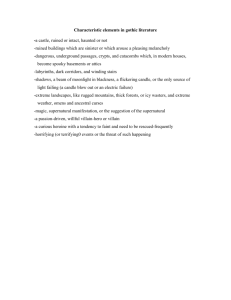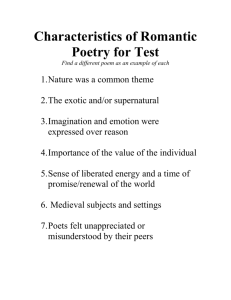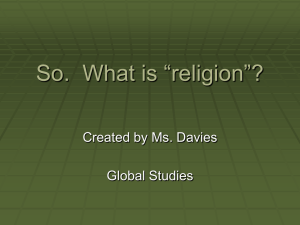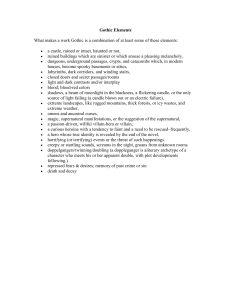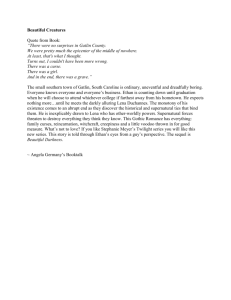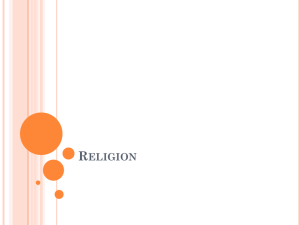Science and Religion in Islam
advertisement
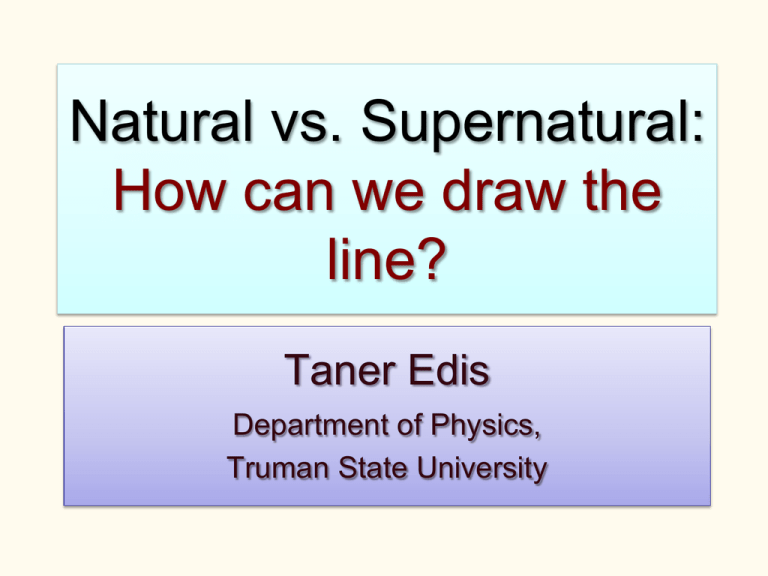
Natural vs. Supernatural: How can we draw the line? Taner Edis Department of Physics, Truman State University Supernatural fiction • Stories of ghosts, gods, spirits, magic, the occult. • Personality and agency (“spirit”) somehow fundamental to how the world works. • Top-down world, not bottom-up. 2011 Natural vs Supernatural 2 Cognitive science of religion • Sharpen understanding of supernatural agency: violations of intuitive ontology. Talking statue, bodiless person, … • Violates but also underlies commonsense natural order. 2011 Natural vs Supernatural 3 Counterintuitiveness • Unlike counterintuitivity of modern physics, “supernatural” violations more limited. (But can be developed by theology—Pyysiäinen.) • Reinforces commonsense dualism of folk psychology. • Personality and agency remains fundamental. 2011 Natural vs Supernatural 4 Ambiguities • No sharp distinction? The natural can gradually shade into the supernatural. • Theologian David Ray Griffin: Psychic powers part of the natural order. “Naturalistic theism.” Personality remains fundamental in a mind-first, top-down view of reality. 2011 Natural vs Supernatural 5 All becomes “natural”? • Dr. Who and other science fiction: Psychic powers a natural capability. Mind-over-matter events are not miracles; maybe some quantum feature. • (Note: Not real QM!) • Some magic can be assimilated into a natural order? 2011 Natural vs Supernatural 6 Sharpening the definition • Nothing wrong with ambiguity. But we might do better. • Draw on intelligent design (ID) and the theistic tradition. ID claims to distinguish between what is mindless (physical/natural) and what is irreducibly mindlike and purposive. 2011 Natural vs Supernatural 7 Intelligent design • William Dembski’s version. • Claim rigorous ID detection: eliminate chance (randomness) and necessity (rules); left with design. • NFL theorems. 2011 Natural vs Supernatural 8 Physical explanations • Combine rules and randomness––what has to be listed explicitly, without a pattern. • Is there anything we see that “chance and necessity” cannot do? 2011 Natural vs Supernatural 9 Physicalism • Philosophical tradition of “chance and necessity”—understood in impersonal terms. Rules and randomness. • We have confidence in the success of physics, in our ability to describe nature mathematically. Bottom-up view. • (Compare to Melnyk—more emphasis on randomness.) 2011 Natural vs Supernatural 10 Random = Patternless Disordered: No correlations. ~ Fair coin flip. Pass all possible statistical tests. No predictability. No pattern. Ordered: Correlated. Has pattern–– predictable. 2011 Natural vs Supernatural 11 Algorithmic randomness 0100011011000111101… • Kolmogorov, Martin-Löf, Solomonoff, Chaitin… • No algorithm correctly gives more than a finite subset of the infinite sequence. • = No correlations, fair coin flip, pass all possible statistical tests. 2011 Natural vs Supernatural 12 Random ~ incompressible • Complexity ~ cost minimum. • Algorithmic complexity H(s): minimum program size required to produce s. • s = 01010101010101… compressible. • Incompressible s: H(s) ≈ |s|. • Random: infinite limit of incompressible sequences. 2011 Natural vs Supernatural 13 Combining rules and dice • Machine with RNG: combines algorithms with randomness. • Every infinite bit sequence (function) 01001011110…: s = algorithm + random part • Is algorithm always finite? 2011 Natural vs Supernatural 14 Completeness • Completeness theorem (Edis 1998). • Combinations of rules and randomness, where the algorithmic structure is always finite, describe all bit sequences. • Machines with RNGs can perform all tasks not requiring specific random infinite sequences. • Gödel does not stand against AI. 2011 Natural vs Supernatural 15 The claims of ID • Mindless physical processes, combining rules and randomness, cannot achieve certain outcomes, such as life or mind. • In particular, the Darwinian combination of variation and selection is not creative. • We need something nonphysical (mind, intelligence—supernatural!) to achieve “specified complexity.” 2011 Natural vs Supernatural 16 Of scientific interest? • Interesting claim: Detecting intelligence. • Proposing new mathematical tools done all the time. • Not obviously crazy. • Interesting question about limits of physics. 2011 Natural vs Supernatural 17 Taking ID seriously • Physicists, biologists, computer scientists, etc. address the best of ID. (Dembski and Behe.) • Young & Edis, Why Intelligent Design Fails (Rutgers UP 2004/6). • ID fails badly. 2011 Natural vs Supernatural 18 Failed design detection • Dembski’s math: lots of technical errors. • ID design-detection proposals overlook combinations of rules and randomness. 2011 Natural vs Supernatural 19 Not fixable? • Completeness: No dependence on specific random infinite sequence proposed by ID. (Not doable: infinite information.) • Biology is accessible to rules and randomness. 2011 Natural vs Supernatural 20 Oracles • One thing could still be the signature of the supernatural: an oracle. Access to infinite information; performing a purposeful task. 2011 Natural vs Supernatural 21 A Halting oracle • Example: no device can solve Turing’s Halting Problem. • No combination of rules and randomness can. • Nothing in physics as we understand it can. • Supernatural? 2011 Natural vs Supernatural 22 Finding an oracle • No definite test. (Noncomputability, finiteness of data.) • Might have experimental data that makes it very plausible. • A black box that looks like it could compute Turing’s Halting Function. 2011 Natural vs Supernatural 23 The Halting Box • Results always correct according to finite approximations to the Halting Function. • Very fast, always at same speed. • Just like quantum RNG in terms of speed etc., only meaningful rather than random. 2011 Natural vs Supernatural 24 Alien technology? • Black box far beyond our capabilities. But may be an alien super-technological finite approximation, not a true oracle? • (Goes for any physical miracle claim, such as healings.) • After a certain point, it becomes perverse not to allow non-physical, supernatural possibilities. 2011 Natural vs Supernatural 25 Intelligent design? • A Halting black box would demonstrate supernatural ID. • Beyond chance-andnecessity. Achieves meaningful task—mindlike, purposeful properties come first. 2011 Natural vs Supernatural 26 Naturalism as a theory • Naturalism (my physicalist version) is a broad theory—that the world is a bottom-up place where life and mind emerges from rules and randomness. • Not just a methodological or regulative principle. • Could empirically shown to be false. Find an oracle. Make ID succeed. 2011 Natural vs Supernatural 27 No oracles • Such counterevidence is nonexistent. • Naturalism is very successful. • Good reason to conclude that gods, ghosts and ghouls are implausible. No supernatural agents appear to exist. 2011 Natural vs Supernatural 28 Books 2011 Natural vs Supernatural 29 Thanks for listening • Questions? 2011 Natural vs Supernatural 30
